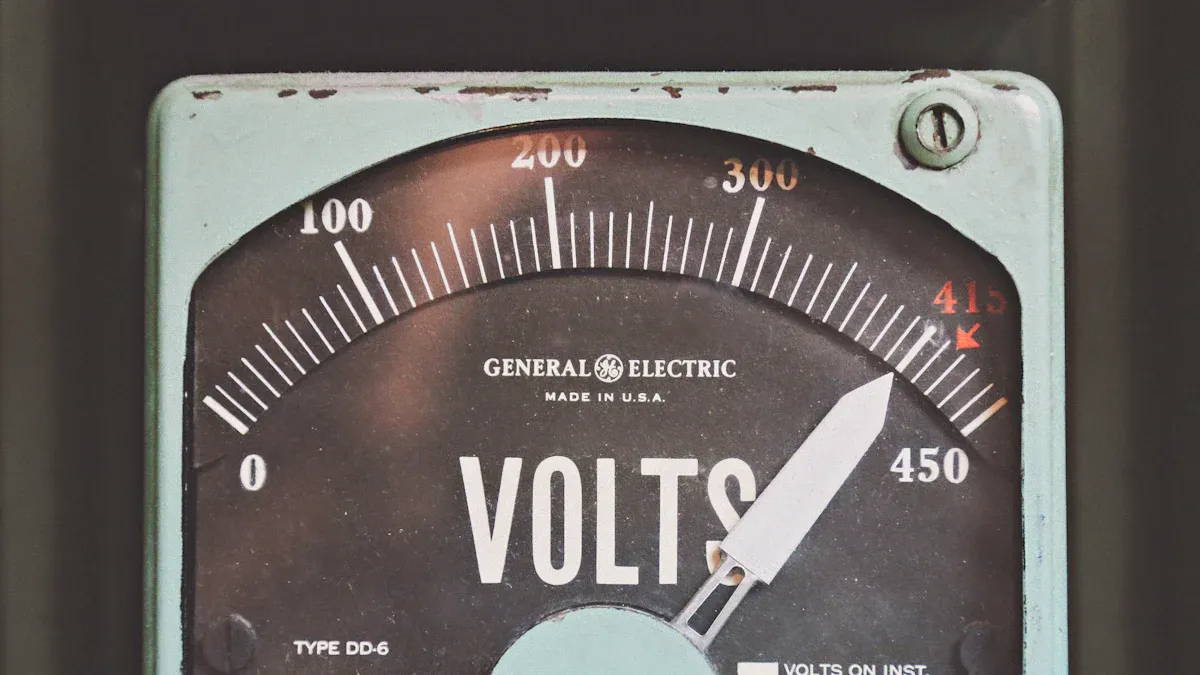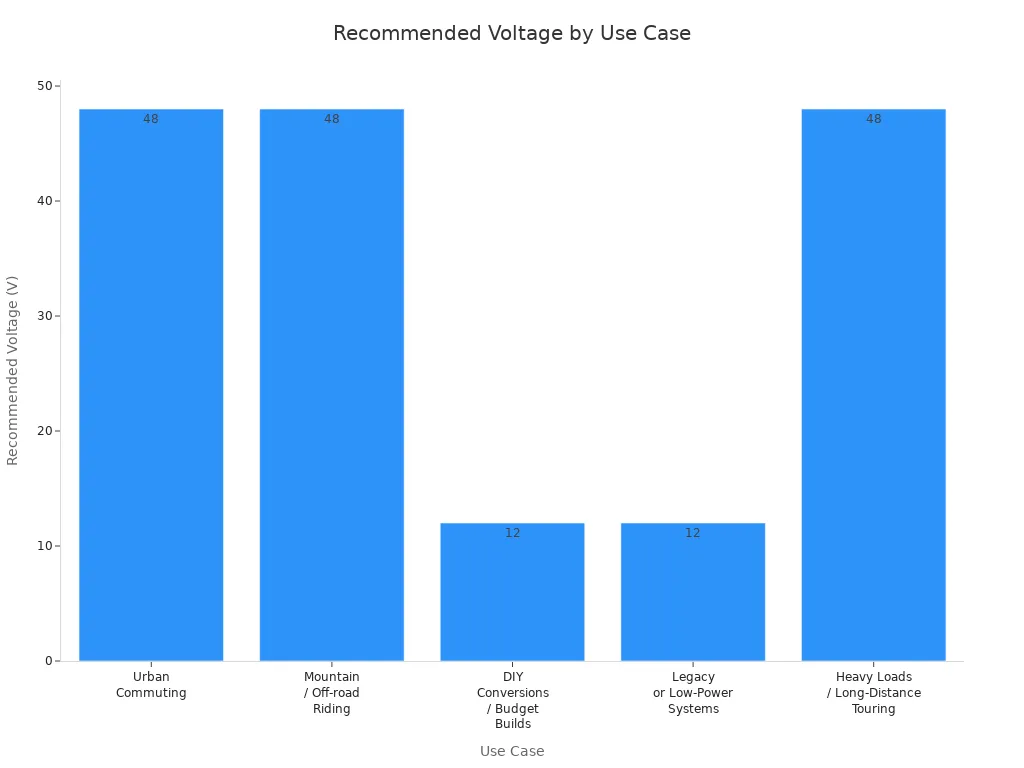
You may ask if a 48 volt battery system is better than lower voltage choices. The table below shows important differences in safety, battery life, performance, efficiency, and cost. Kurui BMS 6 Volt Golf Cart Batteries are a good example of reliable lower voltage solutions.
Aspect | 48V Battery Management System | Lower Voltage BMS |
|---|---|---|
Safety | Advanced monitoring | Basic protection |
Battery Life | Longer with cell balancing | May wear unevenly |
Performance | Stable under high demand | Voltage can drop |
Efficiency | Maximizes energy use | Less efficient |
Cost | Higher upfront, long-term value | Lower initial cost |
Think about what you need and how you use your battery system before you decide. |
A 48V battery system gives more power and works better. It is great for things that need a lot of energy, like electric vehicles and solar energy storage.
Lower voltage systems, like 6V batteries, cost less money. They are good for smaller things, like golf carts. These batteries work well and do not cost much at first.
Think about how much energy you need before you pick a battery system. Also, think about if you want to add more later. 48V systems are easy to make bigger if you need more power.
48V systems have safety features like advanced monitoring and protection. These features help the battery work safely for hard jobs.
Taking care of your battery and charging it the right way helps it last longer. This is true no matter what voltage your battery has.

A 48 volt battery management system gives you more power. It is flexible and can be used in homes or small businesses. You can start with one unit and add more later. This helps you save money as your needs grow. The system works well with solar panels. It stores energy well and does not waste much during charging. You get steady power for things that use a lot of energy, like food trucks or shops. These systems work well with modern inverters. They are easy to set up.
Tip: If you want to add more batteries later, a 48 volt system makes it easy.
Lower voltage battery systems include 6V, 12V, or 24V. People use them in golf carts, small vehicles, and backup power. These systems are simple to use and cost less at first. For example, kurui Technology’s 6 Volt Golf Cart Batteries give steady power for golf carts and small vehicles. Some are even used in factories. These batteries are made for deep-cycle use. They can be charged and used many times. You can pick AGM or lithium types to fit your needs. Lower voltage systems are good if you want something simple and cheap.
Feature | 48V Battery Systems | Lower Voltage Systems |
|---|---|---|
Power Delivery | Good balance of power and efficiency. | Not as efficient with energy. |
Inverter Compatibility | Works well with new inverters. Easy to connect. | May need extra parts to connect. |
Think about what you want most. If you need lots of power and want to add more later, pick a 48 volt system. If you want to save money for a golf cart or small vehicle, lower voltage systems like kurui BMS 6 Volt Golf Cart Batteries are a good choice.

A 48 volt battery system gives more power at once. It works better than 6V, 12V, or 24V systems. You get steady power even when you use a lot of energy. High voltage systems use smaller wires. This helps move power fast and safe. You will see this if you use batteries for electric vehicles or solar storage. Heavy equipment also needs strong power. Lower voltage systems, like kurui BMS 6 Volt Golf Cart Batteries, are good for golf carts and small vehicles. These batteries give steady power for deep-cycle use. But they cannot give as much instant power as a 48 volt system.
Note: If you need strong and steady power for hard jobs, a 48 volt battery system is a better choice.
Energy efficiency helps you save money and waste less. A 48 volt battery system uses energy better than lower voltage systems. High voltage batteries lose less energy when charging and using power. They move electricity with less resistance. In solar power, high voltage systems help you get more energy from your panels. Lower voltage systems may lose more energy when changing voltage. Kurui BMS 6 Volt Golf Cart Batteries work well for their size and use. But a 48 volt battery system helps you get the most from each charge in big or busy setups.
Battery lifespan means how long your battery lasts before you need a new one. A 48 volt battery with LiFePO₄ can last 8 to 15 years if you take care of it. These batteries can reach 4,000 to 6,000 cycles. NMC batteries last 3 to 5 years or about 1,000 to 2,000 cycles. Lead-acid batteries last 1 to 3 years and handle 500 to 1,000 cycles.
Let’s look at some common lifespans:
Battery Type | Lifespan (Cycles) | Lifespan (Years) |
|---|---|---|
LiFePO₄ | 4,000–6,000 | 8–12 |
NMC | 1,000–2,000 | 3–5 |
Lead-Acid | 500–1,000 | 1–3 |
Kurui BMS 6 Volt Golf Cart Batteries are great for lower voltage needs. With care, these deep-cycle batteries last 5 to 7 years. Some people say they last even longer. They give steady voltage and low discharge rates when used a lot. This helps your golf cart or small vehicle work well for many years.
Tip: If you want a battery that lasts long and needs fewer changes, pick a 48 volt battery system for big or tough jobs. For golf carts and similar things, kurui BMS 6 Volt Golf Cart Batteries are a good mix of life and dependability.
Safety is very important when picking a battery system. A 48 volt battery management system has many ways to keep you safe. It checks each cell and the whole battery stack. Here are some things a 48V BMS does:
The system checks voltage for each cell and the whole stack.
It measures how much current goes through the battery.
It watches the temperature of each battery cell.
Overcharge protection stops cells from getting too much voltage.
Over-discharge protection keeps cells from dropping too low.
Thermal management checks if cells get too hot and can slow or stop the battery.
Short circuit protection cuts power fast if something goes wrong.
Current limiting stops too much current from hurting the cells.
All these features work together to keep you and your things safe. The BMS makes sure all cells work well together. It helps stop overheating and lowers fire risk. You can feel safe using a 48 volt battery system for hard jobs.
Lower voltage systems, like kurui BMS 6 Volt Golf Cart Batteries, also have good safety features. The BMS in these batteries balances cells, stops overcharging, and checks temperature. You can pick AGM or lithium types for more safety and less work. The BMS helps your battery last longer and keeps your golf cart running well.
Tip: Always look for cell balancing and temperature checks when picking a battery. These features help stop problems and make your battery last longer.
Reliability means your battery works every time you need it. Maintenance keeps your battery safe and strong. You want a system that does not need much work but always works well.
Let’s see how 48V and lower voltage systems compare:
Metric | Description |
|---|---|
Voltage | The voltage the battery system uses, which is key for safety and how well it works. |
Capacity | How much energy the battery can store, which affects how long it lasts. |
Internal Resistance | The resistance inside the battery, which changes how well it works and how hot it gets. |
State of Charge | How full the battery is, which matters for how well it works. |
State of Health | How good the battery is overall and how long it will last. |
Cycle Life | How many times you can charge and use the battery before it wears out. |
Temperature Sensitivity | How well the battery works in hot or cold places. |
Circuit Protection | Ways to stop damage from too much current or surges, which is very important for high voltage. |
You should keep the battery charge between 20% and 90%. Circuit protection helps stop damage from surges and too much current. People working on batteries must follow the right steps when connecting or disconnecting them. Keeping batteries clean helps stop electrical problems.
Kurui BMS 6 Volt Golf Cart Batteries are easy to take care of. AGM and lithium types need less work than old batteries. The BMS balances cells and stops overcharging. Your battery lasts longer and works well in your golf cart or small vehicle.
Note: Checking your battery often and charging it right helps it last longer. Pick a system with a strong BMS for the best reliability.
When picking a battery system, you should check both the first price and what it costs over time. Here is a table that shows the usual prices for golf cart and electric vehicle battery systems:
Voltage (V) | Price Range (USD) |
|---|---|
36V | $1,800 – $3,000 |
48V | $2,200 – $3,800 |
A 48 volt battery system costs more at the start. Lower voltage systems, like 36V, cost less at first. The battery type you choose also changes your costs later. Lead-acid batteries need you to add water and clean them often. This means you spend more time and money on care. Lithium-ion batteries, like LiFePO4, do not need much care. You can save up to 83% on work costs over ten years. Lithium batteries use less energy and last longer than lead-acid batteries. High-voltage batteries cost more at first, but they can save you money over time.
You want a battery system that works for you now and can grow later. 48V systems use a modular design. You can add or take away units as your needs change. This makes them good for bigger jobs, like storing energy for the grid. Lower voltage systems are easy to set up and are best for small uses, like golf carts or backup power.
Here is a table that shows some problems you might have when adding these systems:
Challenge | 48V Battery Management Systems | Lower Voltage Systems |
|---|---|---|
Efficiency | 95-97% peak, but real-world drops | Often more efficient overall |
Thermal Management | Needs advanced cooling | Simple cooling |
Safety | More safety steps needed | Fewer safety concerns |
Transient Response | Very fast power delivery | Limited by design |
If you want to make your system bigger later, a 48V setup gives you more choices. For small projects, lower voltage systems are easier to put in and use.
You can find 48V battery management systems in many places. They power electric vehicles and store energy from solar panels. These systems help your EV run well and keep your solar setup working. You can also use them for backup power in emergencies.
Application Area | Description |
|---|---|
Electric Vehicles (EVs) | 48V BMS boosts performance and safety in EVs. |
Energy Storage Systems | Manages batteries in solar and renewable energy setups. |
For golf carts, kurui BMS 6 Volt Golf Cart Batteries are a strong and steady choice. These batteries give steady power and last a long time. You can use them in golf carts, small vehicles, and even in some factories. If you want a simple and cheap battery for your golf cart, these are a smart choice.
Tip: Think about how you will use your battery system. If you need to power big machines or want to add more later, a 48 volt battery system is a good pick. For golf carts and smaller needs, lower voltage batteries like those from kurui BMS work great.
When you choose between a 48V battery system and a lower voltage solution, you need to think about what matters most for your situation. Start by looking at your main priorities:
Energy Requirements: You should check how much power you need each day. If you use a lot of energy or run many devices at once, a 48V system can handle the load better.
Cost: Think about both the upfront price and the long-term savings. Lower voltage systems often cost less at first, but a 48V system may save you money over time because it is more efficient.
Compatibility: Make sure your battery system works with your current equipment. Some older setups may fit lower voltage batteries better.
Maintenance: Decide how much time you want to spend on upkeep. 48V lithium systems need less maintenance than lead-acid batteries.
Future Expansion: If you plan to add more devices or grow your system, a 48V setup gives you more room to expand.
Tip: Always match your battery system to your power needs and your plans for the future.
You can pick from many battery management systems. Here are some things to keep in mind:
48V systems use energy better, last longer, and are easy to make bigger for large jobs.
Lower voltage systems, like kurui BMS 6V batteries, are good for small jobs and cost less at first.
What you pick depends on how much power you need, your money, and what you want later.
Use Case | Best Voltage |
|---|---|
48V | |
DIY or budget builds | 12V |
Heavy loads or long trips | 48V |

Before you choose, think about battery chemistry, pack size, and safety features. If you need more help, check guides about BMS features like cell balancing and condition monitoring.
A 48V system gives more power than lower voltage ones. It keeps the power steady when you use big machines. This is good for electric vehicles and solar setups. You can add more batteries if you need more energy.
Yes, you can use these batteries in golf carts and small vehicles. They also work in some factory machines. These batteries give steady power and last a long time if you take care of them.
Look at how much energy you use each day. Think about what you want to power. Use this table to help you pick:
Application | Best Voltage |
|---|---|
Golf Cart | 6V |
Electric Vehicle | 48V |
Backup Power | 12V/24V |
Most batteries only need simple tools for care. AGM and lithium batteries from kurui BMS are easy to look after. Always follow safety rules and check your battery often.
Tip: Always read your battery manual before you do any work. This helps you avoid problems and keeps your battery safe.